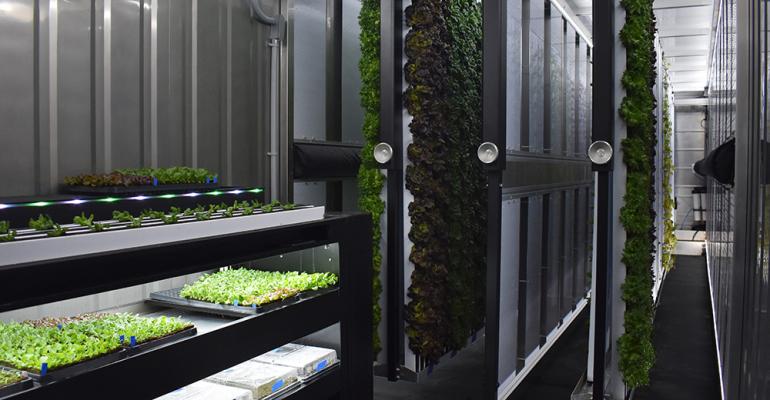Neon Greens will be a vertically integrated salad restaurant where the lettuce is brought from the onsite growers to the kitchen via a conveyer belt floating above customers’ heads.
“Neon Greens is all about radical transparency — that is the whole idea behind us,” said owner Josh Smith.
The restaurant in St. Louis — set to open this summer — is aiming to grow all its lettuce hydroponically, in front of the customers’ eyes.
“The customer is really a part of the produce journey from seed to plate,” Smith said. “They see the whole thing and it happens before their eyes.”
The idea was born out of COVID. During the pandemic, Smith started growing lettuce hydroponically through a kit alongside his partner for fun. Just one month later, Smith had ordered industrial farming equipment and set up over 100 plants in his home.
“Sort of along the lines of storytelling, I’m telling the story,” he said.
The idea for the conveyer belt came from a desire to have produce harvested as close to the time of eating as possible, something Smith learned when he decided to start growing his own lettuce.
“It was really incredible [to] taste a difference,” he said. “I’m sure you’ve experienced going out to your garden and grabbing a tomato and everything tastes better if you eat it within minutes of harvest.”
Most of the lettuce production in the U.S. is in California and Arizona, meaning that it has a long journey to get to the Eastern seaboard and the Midwest. That lettuce does certainly not retain the peak of freshness that Smith is aiming for.
“It’s usually, on average, two and a half to three weeks old by the time you bite into it,” he said. “And it’s packed in nitrogenated packages, which is like Frankenfood. It’s not really the way that food is supposed to be.”
The quick-service restaurant will differ from its peers in many ways, but building design is not one of them. The concept will use a modular design, similar to many other quick-service chains, that can be put anywhere and be an easy build, even with the hydroponics.
Smith hesitated to call the units shipping containers but said they were similar.
“When you walk inside, they look like they're from the future,” he said. “There are giant vertical racks of LEDs and giant vertical racks of growing lettuce that you see in front of you.”
Smith’s background isn’t in the restaurant industry. Before landing here, he was a designer for film and theater in New York City. He moved back home to St. Louis and decided that the middle of the country needed some healthy QSR restaurants.
“Really, it’s hard to get a salad for lunch,” he said.
There are no plans to expand to the coast as the restaurant grows.
“There’s just a different salad chain every few blocks,” he said. “Part of my inspiration for starting the restaurant was just eating at these places and knowing that the lettuce came from California and tasting it and really noticing how they had to add a bunch of dressing and super salty, sweet ingredients to mask the inferiority of the lettuce.”
He finds the problem even bigger in the Midwest, with food deserts where opeople don’t have access to fresh, local ingredients. And he thinks that it would help people to eat more greens if they tried local or hydroponic greens.
“I kept saying to myself, ‘man, if people had lettuce like this, they would eat it every day,’” he said.
Smith imagines Neon Greens locations in places where consumers don’t have access to fresh lettuce because of the climate and growing season.
“I see it in places where there are droughts that are really taking over,” he said. “Places where climate change is making it very difficult to have any sort of a consistent presence of agriculture like this.”
In terms of food, the salads have global influences, another way Neon Greens is attempting to expand the palates of the Midwesterners it will serve. Currently, there are plans for 10 proprietary salads and an option for make-your-own salads using local ingredients. There will also be a proprietary soup that will be aptly colored neon green.
The restaurant will also serve Pão de Queijo, or Brazilian cheesy bread, and soft serve using things like herbs and other produce grown in the garden. The soft serve tastes really good, according to Smith, despite its odd flavors.
But at the end of the day, Neon Greens is about the way the produce is grown, something that’s only increased with COVID. Smith says people are more apt to choose produce that’s been locally grown as a general awakening of customers’ mindsets has changed consumer habits.
“People are starting to care and, I think that’s so great,” he said. “And I want to be part of that story.”





